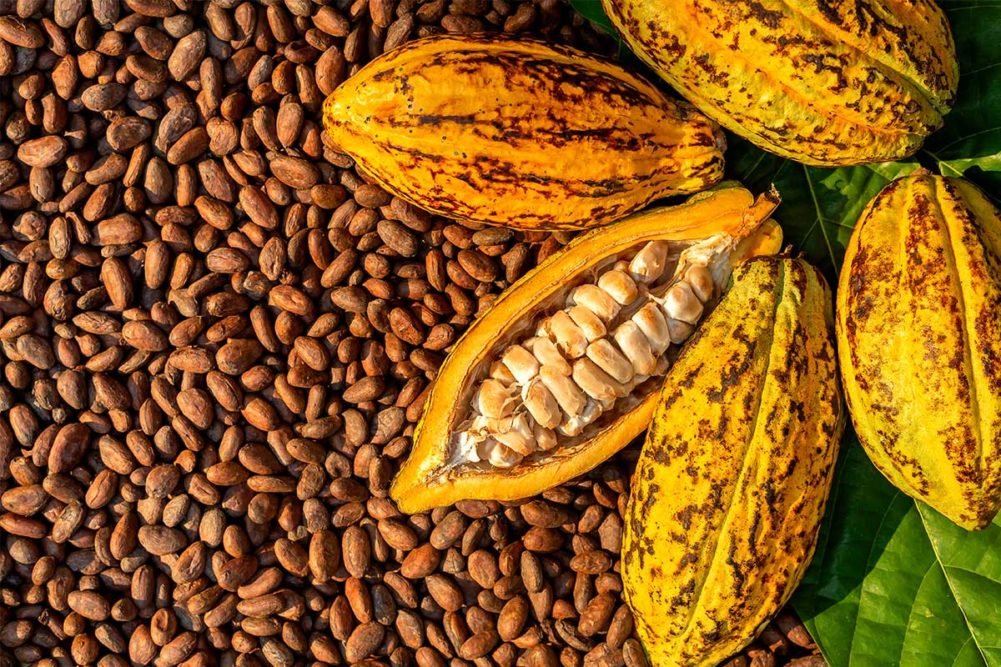Cocoa-producing companies are tackling the challenges of the industry in several ways.
“To make sure farming remains viable for future generations, we need climate-smart agricultural practices that both help farmers to get more from their crops and protect the landscape in which those crops are grown,” said Andrew Brooks, head of cocoa sustainability, OFI. “At OFI, our agronomists seek to understand the biological factors that influence cocoa quality and yields while also tackling some of the biggest sources of emissions in cocoa.”
The company is conducting fertilization trials across four countries and more than 170 farms as part of its Cocoa Soils Initiative.
“The outcomes will help inform best practices for fertilizer use, contributing to healthier soils and better yields for cocoa farmers across our sourcing network,” Mr. Brooks added.
The company’s Cocoa Compass program supports cocoa farmers in nine countries with achievements that include 100% traceability, child labor monitoring, enhancing the accuracy of deforestation monitoring and helping farmers increase yields.
“We’ve also helped more children access education by providing school supplies, sourcing birth certificates needed for enrollment and rehabilitating or building schools,” Mr. Brooks said.
Global Organics’ chocolate is made in Italy by ICAM, whose sustainability programs promote responsible cocoa cultivation, said Dave Beaulieu, global buyer/operations manager at Global Organics.
“These programs have helped preserve critical habitats and biodiversity by discouraging deforestation and encouraging sustainable land use,” he said. “Additionally, ICAM’s initiatives have focused on addressing social issues in cocoa-growing communities. They have worked toward improving the livelihoods of farmers, ensuring fair wages and providing access to education and health care.”
Cargill’s Cocoa Promise program promotes sustainability efforts in Ivory Coast, Ghana, Cameroon, Indonesia, Brazil and Ecuador and helps raise living standards in growing communities. Over the years, it has expanded to include a broader range of economic, social and environmental issues.
“In 2022 alone, we built and handed over 17 schools in Ghana, Cameroon and Ivory Coast, thus supporting education for hundreds of children,” said Kate Clancy, group sustainability director, Cargill Cocoa and Chocolate. “We’ve also worked to eliminate other barriers, such as helping thousands of families secure birth certificates for their children, an important first step to accessing education.”
Moreover, the program is educating farmers as well.
“All of the farmers in the Cargill Cocoa Promise have received training in good agricultural practices which plays a key role in improving farmer livelihoods as it helps them increase their productivity and profitability,” Ms. Clancy explained. “Additionally, at the end of 2022, we held a graduation ceremony for the first class of 700 cooperative leaders to complete our renewed Coop Academy. This is our flagship program to equip farmers with the professional skills and financial support to strengthen their cooperatives.”
Cargill has encouraged farmers to adopt agroforestry practices, helping to reforest areas by planting more than 1.2 million trees while supplementing farmers’ incomes. The company had mapped 70% of farmers in its direct supply chain as of 2021, which allows the company to monitor tree cover loss and assess land use changes. Its CocoaWise digital platform allows customers to access metrics, mapped data points and insights into the carbon footprint of the product, Ms. Clancy said.
Although the challenges of addressing all of the problems that come with cocoa production are many, companies are working to stem the adverse environmental impact, educate farmers and improve the lives of communities where cocoa is grown.
“By embracing sustainable-sourcing practices, insisting on transparent and traceable supply chains, and collaborating to bring impactful change, brands lay the foundation for a compelling story they can share,” Ms. Clancy said. “It’s a story that matters to the farmers who cultivate and harvest cocoa beans, to their families and the communities where they live, to the forests we depend on, and to the consumers who purchase their products.”
This article is an excerpt from the December 2023 issue of Baking & Snack. To read the entire feature on Chocolate, click here.




